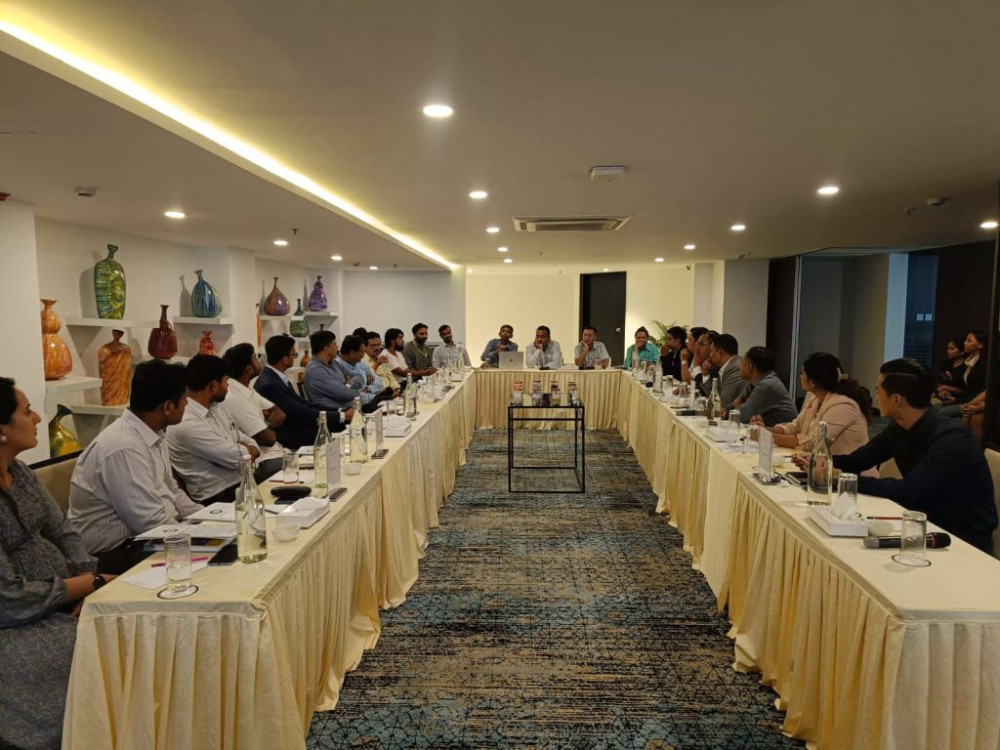

2023-10-07
Roundtable Discussion on Plastic Waste Management and Role of Extended Producer Responsibility (EPR) for Plastic Circularity in Nepal

Fast-moving Consumer Goods constitute products with rapid turnover and relatively low durability, including items like packaged foods, beverages, personal care products, and household cleaning supplies. Fast-moving Consumer Goods (FMCG) play a vital role in modern society, but their widespread consumption also presents significant challenges in waste management. As the population increases, plastic usage and thereby waste generation is also growing. Approaches to managing waste in the municipalities of Nepal include unorganized dumping and open burning. On average, 48% of the waste in municipalities is landfilled, while 32% is burnt, and 27% is openly dumped on riversides. Open burning is directly linked to air pollution and its harmful effect on the health of common citizens. According to a report by the World Bank (2019), Kathmandu alone generates over 400 tons of plastic waste daily.
To uncover the opportunities and challenges on plastic waste management, Doko Recyclers in collaboration with One to Watch and USAID Clean Air conducted a round table discussion on October 5th, Thursday with leading FMCG producers, cement industries and plastic manufacturers with representatives from Unilever Nepal, Bottlers Nepal (Coca Cola Nepal), Yashoda Foods, Nepal Dairy, Sarbottam Cement, Surya Nepal, Lucky Group, Century Foods, Plast Nepal, Green Road Waste Management and more.
Key discussions of the event:
Consumer Awareness
Emphasis was made on consumer awareness and behavioral change being the key for solving the problem of plastic waste management. For widespread awareness among consumers, stakeholders must act in a collective manner be it the government, private sector or development partners. The producers can play an important role in spreading awareness by having messages on their packaging that educate the consumers about waste segregation fostering a culture of sustainability that benefits both present and future generations.
Role of Government
The responsibility for implementing Extended Producer Responsibility (EPR) and effective plastic waste management in Nepal falls significantly on the government and municipalities. The Local Government Operation Act 2015 (LGO Act) also gives mandate to local governments to manage solid waste efficiently and effectively. The government could support plastic waste management by focusing on infrastructure development, including investing in infrastructure for plastic waste collection, segregation, and recycling.
A public-private partnership was also pointed out as a major factor in managing plastic and packaging waste. The government and municipalities should collaborate with industry stakeholders, NGOs, and international organizations like USAID to leverage expertise, resources, and best practices in plastic waste management.
Bottlenecks for Plastic Waste Management
The government has failed to develop frameworks of EPR for producers. Currently, the private sector is not consulted with by the government while making policies and regulations that affect them. While other countries provide subsidies on waste collection and management,” Kabadi Tax” is levied by the government in Nepal which is very discouraging for the entrepreneurs working in the waste management sector.
For non-recyclable plastics, the collection value chain is a major bottleneck. Multi Layered Plastics (MLPs) can be used in construction of roads and in cement industries in the form of RDF as replacements for coal. The total cost of producing RDF for cement industries including the purchase of raw materials, transportation cost, segregation cost, shredding cost, packaging and taxes comes to approx Rs.40-45 per kg. With such high costs, the use of RDF as replacement for coal does not make a sustainable business case.
Initiatives taken by companies
Unilever Nepal produces HDP and LLP plastics that are easily collected and recycled. For the MLP plastics, they are reducing the size and GSM of the plastics to make them into recyclable form. Bottlers Nepal have also redesigned their PET bottles and are now using affordable small sparkling packages using less plastic waste generated where the PET bottles are still recyclable.
On the other hand, Sarbottam Cement showed positive interest in managing non-recyclable combustible fraction of municipal waste where they have been experimenting with RDF in their factory for the past three years. Surya Nepal has been working with Green Road Waste Management for construction of plastic roads near their factory as a part of their CSR efforts.
Use of CSR Funds
There is no direct EPR scheme for plastics but the Industrial Enterprise Act (IEA) from 2016 requires businesses to direct 1% of their profits annually to corporate social responsibility (CSR) providing a window for business sectors to contribute to plastic waste management. Most of the attendees raised the issue of clarity in government policies in regards to the CSR budget and its mandates.
In conclusion, effective plastic waste management requires a shared responsibility among FMCG producers, importers, and consumers. Everyone bears a substantial responsibility in minimizing plastic waste generation through sustainable packaging solutions, reduced plastic use, and eco-friendly product designs. Private sectors are the key stakeholders and the government should recognize the efforts of the private sector to manage plastic waste including making the part while forming new policies or regulations that affect them. Moreover, segregation of waste at household level must be enforced by the government. Consumer awareness is majorly needed along with the setup of waste collection bins in every ward for disposal of waste in a segregated manner.
Rashie Agrawal, Head of Communications